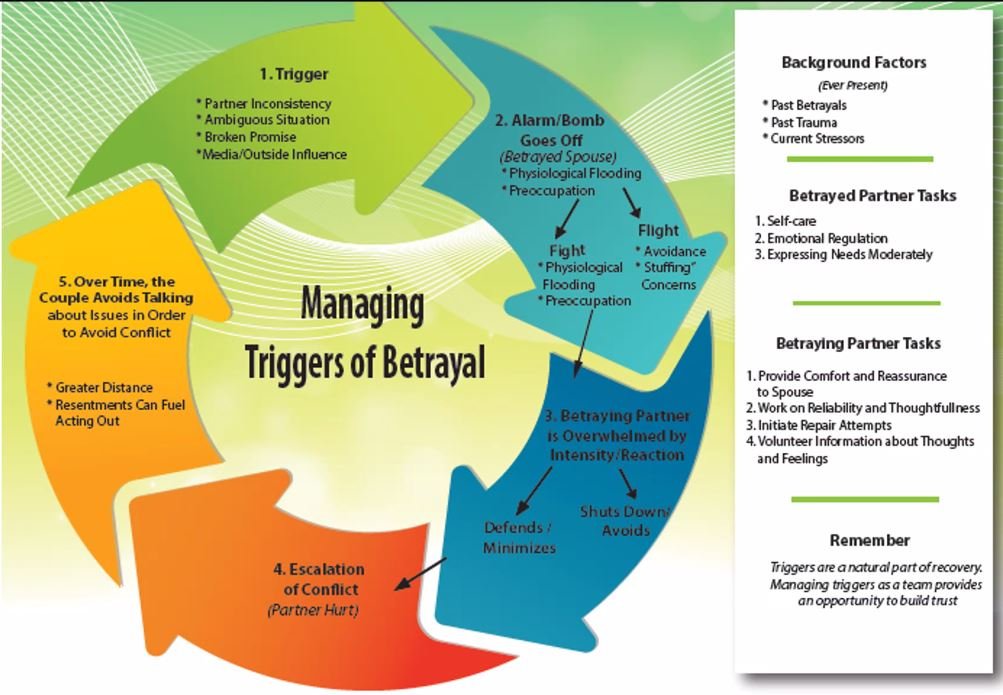How To Rebuild Trust After Betrayal
In "How to Build Trust After Betrayal," we talk about how hard it is to fix relationships that have been broken by sex or porn addiction or repeated cheating. It is very important to understand the "Betrayed Partner Trauma Trigger Cycle" on this trip. This blog walks both partners through six stages of healing and stresses how important it is to understand, be consistent, and talk to each other. Find out why "grand gestures" don't always work and look into ways to build trust and security again. It's more than just a guide; it's a helpful friend for people who are trying to rebuild trust in relationships that have been damaged by addiction.
The 10 Reasons People Cheat
The Top 10 Reasons Why People Cheat
Infidelity is an investigation into the hidden rooms of our emotional lives, not merely about secret meetings and texts. The most recent article by Blair Bisher, "The 10 Reasons People Cheat," explores the complex causes of this contentious issue. The paper sheds light on the numerous psychological and emotional undercurrents that result in affairs, drawing on a significant 2020 study by researchers Selterman, Garcia, and Tsapelis. Know the complex web of reasons why people break their promises, from feelings of rage and low self-worth to the excitement of taking chances.
A thorough analysis of the research reveals that adultery is not a binary situation. The reasons for ending a relationship are as diverse as they are unexpected, whether motivated by the lack of love or the desire for change. Beyond the obvious motivations for cheating, Bisher takes into account other elements like thrill-seeking and retaliation. This raises the question of whether cheaters are looking for a way out or inadvertently hoping to be discovered.
Discover the transforming power of understanding with "The 10 Reasons People Cheat." Discover the emotional geography of relationships and how commitment and love can withstand betrayal.
Keywords: Emotional Affairs, Relationship Recovery, Adultery Research, Reasons for Cheating, Infidelity, Blair Bisher, The Selterman Garcia Tsapelis Study, Esther Perel, Cheating Aftermath, Relationship Bonds, Cheater's High, and Cognitive Dissonance.
“Why Did I Cheat on My Wife?”
“Why did I cheat on my wife?!” is the most common question I’m asked. We know that one-in-three husbands will cheat. Here, I’ll explore the complexities of infidelity including defining infidelity, the effects of infidelity, frequently held misconceptions, the underlying causes, techniques for combating it as well as looking at 3 research studies. I will attempt to dive deep into the subject and bring some clarity and answers to this difficult question, and others. Comprehending the causes of cheating behavior is a vital step in the healing and recovery process.
Uncovering Healthy Sexual Fulfillment
Discovering healthy sexual fulfillment requires commitment from oneself as well as openness towards communication with partners (if applicable). Whether exploring fantasies solo or connecting intimately with another person (or people!), focus on creating an atmosphere where everyone involved feels comfortable enough to express their desires without fear of judgment or shame. With honesty, bravery, respect, communication—and lots of exploration—you will soon find yourself uncovering deeper layers of pleasure than ever before.
The Science of Love: Gottman's Love Lab Findings
Gottman is a world-renowned relationship expert, and his work has changed the way we think about love and marriage. His research includes studying what he calls "the masters and disasters of love"—couples who have either made their relationship work or seen it fall apart. After studying these couples, Gottman was able to identify four behaviors that he called "the four horsemen of the apocalypse." These four behaviors—criticism, contempt, defensiveness, and stonewalling—were present in every failed relationship, while couples who had lasting relationships did not exhibit these behaviors.
Criticism is when you attack your partner's character rather than their behavior. For example, "you're such a slob" is a criticism, whereas "I don't like it when you leave your clothes on the floor" is not.
Contempt is when you see your partner as beneath you and speak to them accordingly. This could manifest as name-calling, eye-rolling, or mockery.
Defensiveness is feeling the need to justify your actions instead of taking responsibility for them.
Stonewalling is shutting down emotionally and withdrawing from the conversation altogether.
Search for Blog Posts via the Word Cloud Below:
- Porn Addiction
- Sex Addiction
- sex addiction
- porn addiction
- Compulsive Sexual Behavior Disorder
- recovery
- therapy
- Education
- Affair Recovery
- Research
- addiction
- Infidelity
- Partners of a Sex Addict
- Brain on Porn
- Depression
- Boston
- Compulsive Sexual Behavior
- Affair Repair
- Book Club
- infidelity
- the science of addiction
- mindfulness
- Porn







